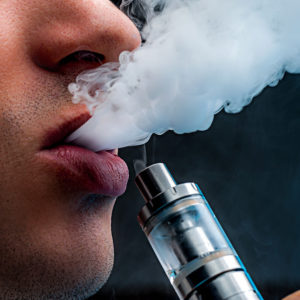In an unprecedented move, Michigan announced a state-wide ban on all flavored vaping products that would go in effect in a matter of weeks. Gov. Whitmer cited “youth addiction” as the culprit. What the Governor fails to see, however, is that this ban would only encourage black market products – the very cause of the health outbreak.
Eli Alsmait, owner of the Smoke Shop in Port Huron, Michigan, is concerned about the implications of the ban. “[It’s] going to hurt the whole business,” said Alsmait as half of his revenue comes from flavored products. With the ban only giving firms 30 days to comply, businesses like Alsmait’s would be forced to remove $30,000 dollars’ worth of merchandise, no easy task.
But while the Governor hasn’t pulled the trigger yet, the desired effects on teen health could backfire.
Earlier this year, San Francisco became the first city to ban all vaping products. In response, the city’s Chief Economist, Ted Egan said that this will only shift people away from vaping back to smoking. As the trend has shown that smoking rates for youth have plummeted in part due to vaping, San Francisco should be a warning to what could happen in Michigan should the ban go in effect.
Former FDA commissioner, Scott Gottlieb noted the Governor’s ban could unintentionally give rise to counterfeit flavored products. In China, over 30 entities have already been sued for counterfeit products which contain THC (a carcinogenic chemical found in marijuana), and other unknown harmful substances, whose similar appearances can fool even the savviest consumer.
In Wisconsin alone, the Department of Health Services found that 89 percent of the cases were caused by counterfeit cartridges.
To put all this in context, nowhere has it been found that vaping by itself is linked to any of these illnesses but rather is caused by illegal and counterfeit cartridges. Research also indicates that vaping is twice as effective as traditional nicotine replacement therapies, like the nicotine patch or gum.
In contrast to vaping, 480,000 Americans die from smoking with an additional 40,000 from second-hand smoking. According to the BMJ, over 6 million lives could be saved over a ten year period if people switching to vaping.
Yet, despite the evidence that these outbreaks are being caused by illicit substances, Wisconsin still “urges people not to vape.” Despite the fact that over the last 5 years no health issues have been caused by normal vaping while at the same time numerous studies have highlighted that vaping is still 95 percent safer than regular cigarettes. Given what we currently know, state and local government are using faulty generalizations to enact policies based on fear.
Despite Gov. Whitmer’s best intentions, perhaps the ones hit the hardest would be the current smokers. 48 percent of smokers said restricting flavors would make vaping less enjoyable while 40 percent said it would make them less likely to quit altogether. In fact, evidence shows that bans on flavoring can “likely reduce the smoking/vaping rates, but the use of cigarettes would be higher than in the status quo.”
In a potentially dangerous precedent, Michigan has declared all flavored vapes to be illegal, promoting the hysteria on vaping. Consumers vote with their dollars and they are in the best position to decide the fate of flavored vaping products. If not consumers, then maybe legislative authority should be the deciding factor, but it certainly should not be up to the Governor’s prerogative. But until then, Michigan just took a big step backward.

